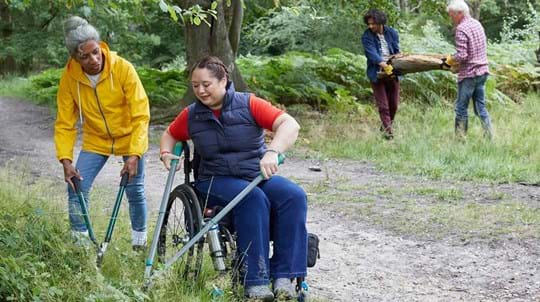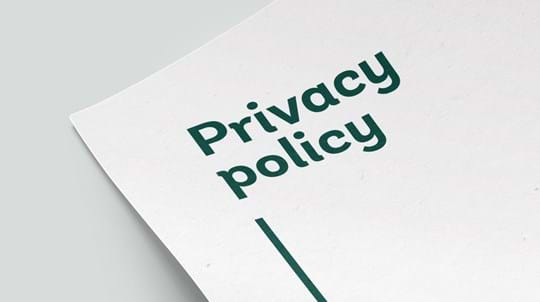
About us
Ethical policy
Our ethical policy details our sustainable, diverse and ethical principles, how we embed these across our organisation and use them to navigate conflicting demands.
This policy applies to all people working for the Woodland Trust, and any Company which is a subsidiary or holding Company of the Woodland Trust ('the Trust') or working on the Trust's behalf in any capacity, including:
This policy does not form part of an employee's contract of employment and it may be amended at any time.
It is our policy to conduct all of our business honestly and ethically. We take a zero-tolerance approach to bribery and corruption and are committed to acting professionally, fairly and with integrity in all our business dealings and relationships. This includes implementing and enforcing effective systems to counter bribery and corruption.
We uphold all UK laws essential to countering bribery and corruption in the jurisdictions where we operate, including the Bribery Act 2010, in respect of our conduct both at home and abroad.
We take our legal responsibilities very seriously. It is a criminal offence to offer, promise, give, request or accept a bribe to or from third parties, including:
Employees found guilty of corruption or bribery can be punished with up to 10 years' imprisonment and/or a fine. As an employer, if we fail to prevent bribery we can face an unlimited fine, exclusion from tendering for public contracts and damage to our reputation.
Corruption is the abuse of entrusted power or position for private gain.
Bribery is offering, promising, giving or accepting a financial or other advantage intended to coerce someone into acting illegally, unethically or unjustly, or rewarding them for doing so.
An advantage includes:
It is unacceptable for an employee (or someone on their behalf) to:
We do not make and will not accept facilitation payments or kickbacks of any kind.
Also known as 'back-handers' or 'grease payments', facilitation payments are typically small, unofficial payments made to secure or speed up a routine or necessary action (for example, by a government official). They are not common in the UK but are common in some other jurisdictions.
Kickbacks are typically payments made in return for a business favour or advantage.
Employees must avoid any activity that might lead to a facilitation payment or kickback being made or accepted by the Trust or on our behalf, or that might suggest that such a payment will be made or accepted. If someone is asked to make a payment on our behalf, they should always be mindful of what the payment is for and whether the amount requested is proportionate to the goods or services provided. They should always ask for a receipt which details the reason for the payment.
This policy allows reasonable and appropriate hospitality or entertainment given to, or received from third parties for the purposes of:
The giving and accepting of gifts is allowed in certain circumstances.
Promotional gifts of low value such as branded stationery to or from existing customers, suppliers and business partners is usually acceptable.
Reimbursing a third party's expenses or accepting an offer to reimburse our expenses (for example, the costs of attending a business meeting) would not usually amount to bribery. However, a payment in excess of genuine and reasonable business expenses (such as the cost of an extended hotel stay) is not acceptable.
We appreciate that practice varies between countries and regions and what may be normal and acceptable in one region may not be in another. The test to be applied is whether in all the circumstances the gift, hospitality or payment is reasonable and justifiable. The intention behind it should always be considered.
The Trust does not make contributions to political parties. We only make charitable donations that are legal and ethical under local laws and practices. No donation must be offered or made without the prior approval of a Director.
The Trust must keep detailed financial records, and we have appropriate internal controls in place to evidence the business reason for making payments to third parties.
Our employees must complete and have authorised the Anti-Bribery Gift Authorisation Form and submit the completed form to HR. They must also submit all expenses claims relating to hospitality, gifts or payments to third parties in accordance with our expenses policy and record the reason for expenditure.
All accounts, invoices and other records relating to dealings with third parties – including suppliers and customers – should be completely accurate and transparent. Accounts must not be kept 'off-book' to facilitate or conceal improper payments.
Our employees are encouraged to raise concerns about any issue or suspicion of bribery or corruption as early as possible.
If they are offered a bribe or asked to make one, or if they suspect that any bribery, corruption or other breach of this policy has taken or may take place, they must notify the HR Department and a Director as soon as possible.
Employees who refuse to accept or offer a bribe, or who raise concerns or report another's wrongdoing, are sometimes worried about possible repercussions. We encourage openness and will support anyone who raises genuine concerns in good faith under this policy, even if they turn out to be mistaken.
We are committed to ensuring that nobody suffers detrimental treatment as a result of refusing to take part in bribery or corruption, or because of reporting their suspicion of an actual or potential offence.
Training on this policy forms part of the induction process for all employees of the Trust, and training will be provided as necessary.
Our zero-tolerance approach to bribery and corruption is communicated to all suppliers, contractors and business partners at the outset of our business relationship with them, and as appropriate thereafter.
Any employee who breaches this policy could face disciplinary action, which could result in dismissal for misconduct or gross misconduct.
We may terminate our relationship with other individuals and organisations working on our behalf if they breach this policy.

About us
Our ethical policy details our sustainable, diverse and ethical principles, how we embed these across our organisation and use them to navigate conflicting demands.

About us
We believe everyone, no matter who they are or where they live, deserves to benefit from woods and trees.

About us
We report on our gender pay gap in accordance with government guidelines.

Privacy policy
Find out how we respect the privacy of our supporters and visitors to our websites.

About us
We're committed to ensuring that modern slavery and human trafficking don't exist anywhere in our organisation, corporate activities or supply chain.